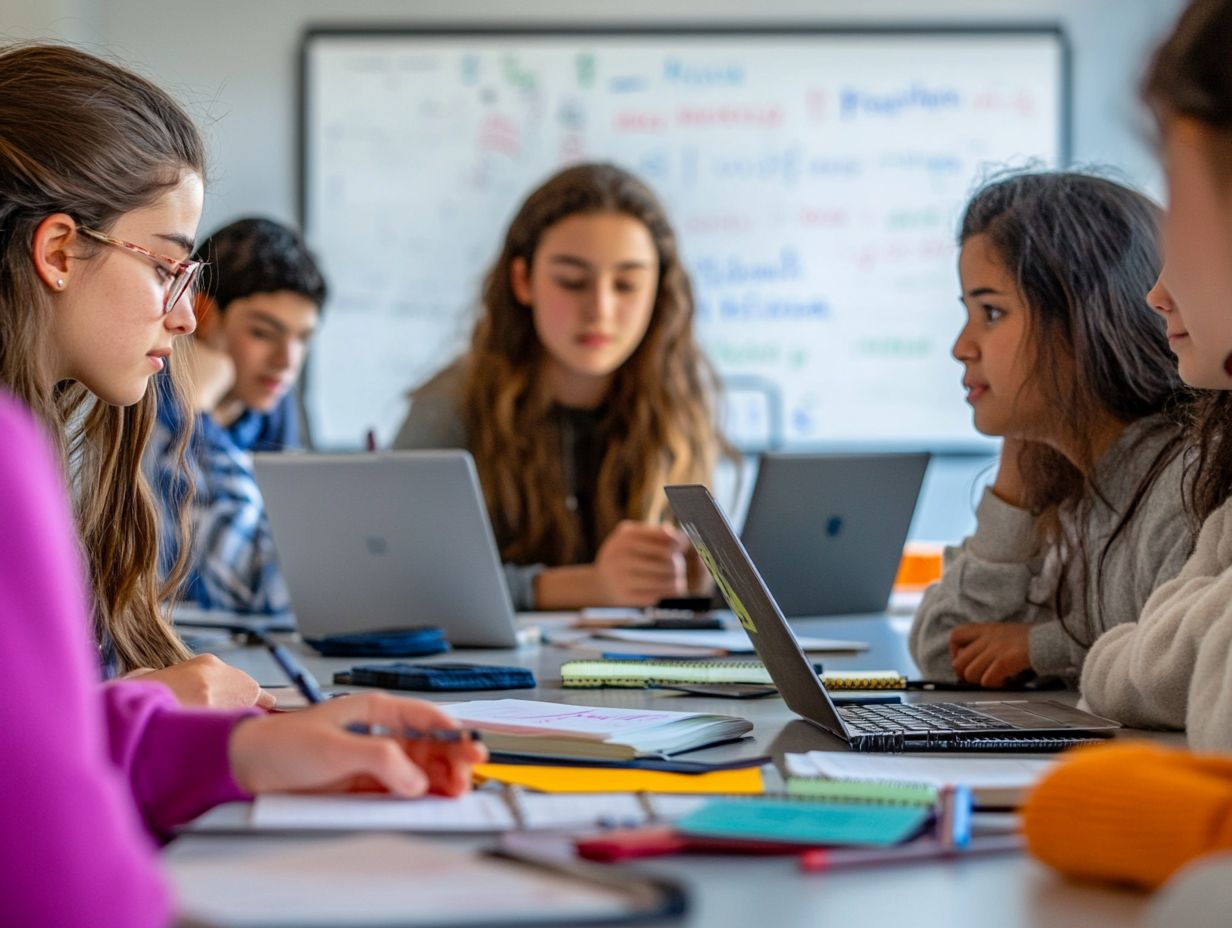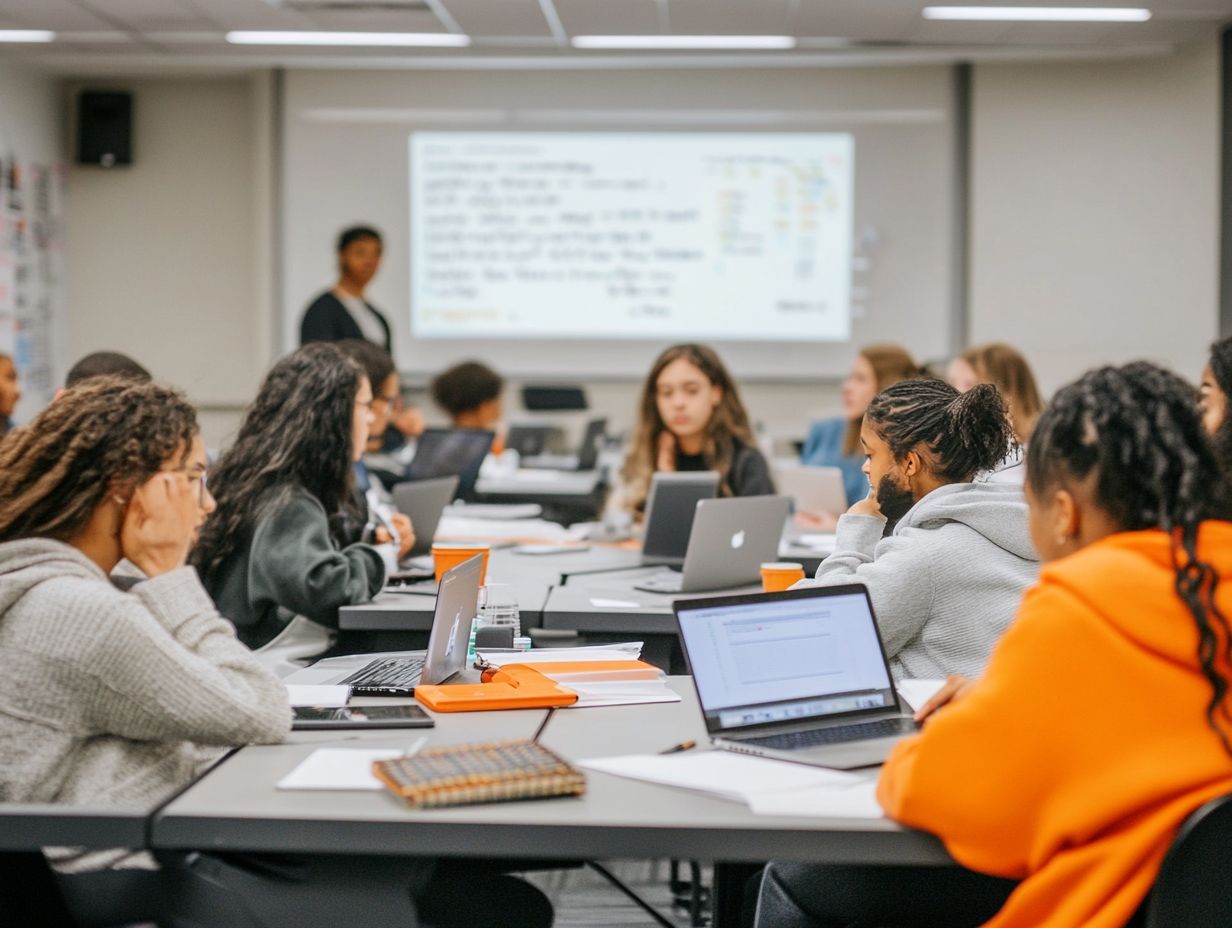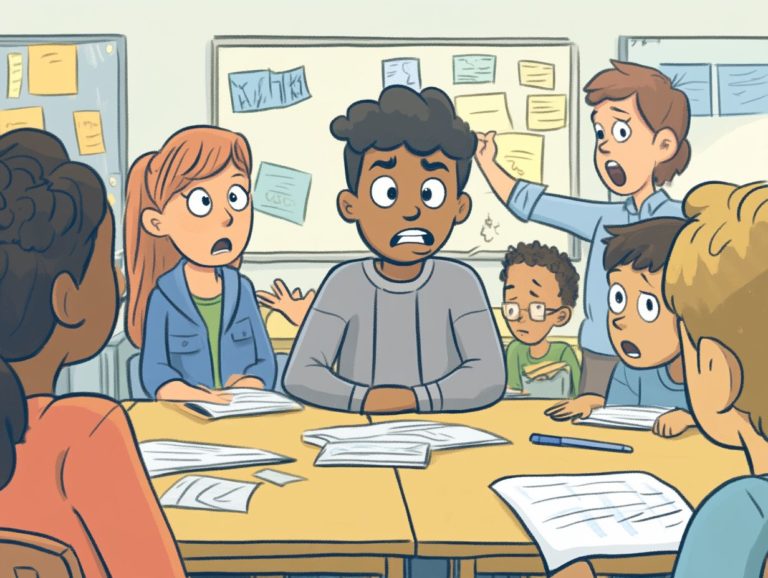5 Tips for Effective Language Learning
Embarking on the journey of learning a new language can feel both exhilarating and intimidating.
You might want to boost your career, connect with different cultures, or challenge yourself. Effective language learning strategies are essential.
This article shares five essential tips. These tips will help you set realistic goals, practice regularly, and fully immerse yourself in the language.
You will also discover the importance of language learning, common challenges, and ways to stay motivated. Get ready to unlock exciting opportunities!
Contents
- Key Takeaways:
- 1. Set Realistic Goals
- 2. Practice Consistently
- 3. Immerse Yourself in the Language
- 4. Utilize Different Learning Methods
- 5. Don’t Be Afraid to Make Mistakes
- Why Is Language Learning Important?
- Frequently Asked Questions
- Q1: What are the five tips for effective language learning?
- Q2: How can setting clear goals help with language learning?
- Q3: Why is consistency important in language learning?
- Q4: How can I immerse myself in the language I am learning?
- Q5: Why is it important to use a variety of resources when learning a language?
- Q6: How can seeking feedback and corrections help improve my language skills?
Key Takeaways:

- Set realistic goals to keep you motivated!
- Consistent practice is your key to success!
- Immerse yourself in the language by surrounding yourself with native speakers or using media in the language.
1. Set Realistic Goals
Setting realistic goals is essential in your language learning journey. It helps you maintain motivation while providing a structured path to fluency.
Whether you’re aiming to master vocabulary, refine your pronunciation, or engage in conversation, having clear objectives enables you to measure your progress effectively.
Breaking your goals into smaller, achievable tasks fosters a sense of accomplishment. This encourages you to practice consistently and utilize a variety of resources, like apps and online courses, for valuable feedback and correction.
By crafting goals that are specific, measurable, achievable, relevant, and time-bound (SMART), you enhance your learning experience and create a roadmap to success. A short-term goal might be to learn five new words each week. A long-term goal could be achieving conversational fluency by a specific date.
Setting specific skills, like grammar or listening comprehension, allows you to tailor your efforts to the areas that need improvement. Tracking tools like progress journals or language learning apps can further motivate you and provide insights into your growth, leading to a more enriching learning journey.
2. Practice Consistently
Consistent practice is your secret weapon for achieving fluency in a new language. It s through regular engagement that you reinforce your skills and enhance your comprehension in speaking, writing, reading, and listening.
To deepen your understanding of the language, explore various methods tailored to your unique learning style:
- Daily speaking exercises can work wonders for building your confidence.
- Writing prompts spark creativity and reinforce crucial grammar rules.
- Listening to audio materials, like podcasts or audiobooks, boosts your comprehension and sharpens your pronunciation.
- Methods that help you remember words better by reviewing them at set intervals will aid retention.
- Additionally, joining language exchange groups or working with a tutor offers invaluable opportunities for real-time conversation practice.
This allows you to tackle common pronunciation challenges and receive constructive feedback essential for your growth.
3. Immerse Yourself in the Language
Immersing yourself in the language is one of the most effective ways to accelerate your language acquisition. It exposes you to real-life contexts and cultural nuances that classroom settings often lack, making it beneficial to learn how to incorporate language learning into daily life.
By living in a Spanish-speaking country, you’ll find yourself surrounded by everyday conversations and regional dialects. Engaging in local language exchange groups presents invaluable opportunities to practice speaking with native speakers, who can offer immediate feedback and help you refine your pronunciation.
These social experiences aren’t just enjoyable; they facilitate building a robust vocabulary and understanding idiomatic expressions that textbooks often overlook. Such authentic interactions will foster your confidence and fluency, paving the way for more meaningful communication.
4. Utilize Different Learning Methods

Using a variety of learning methods makes your language learning experience richer. For example, mastering Spanish can be more effective when it caters to your unique preferences and helps you develop skills in reading, writing, and conversation.
Popular apps like Duolingo, Babbel, and Memrise can significantly enhance your journey. These platforms offer engaging exercises that make it easier to grasp vocabulary and grammar.
Traditional methods like reading books and listening to audiobooks also provide essential context and deepen your understanding of language nuances.
Combining these approaches boosts your motivation. You will see measurable progress and enjoy the flexibility of choosing activities that resonate with you.
5. Don’t Be Afraid to Make Mistakes
Embracing mistakes is essential for growth. Each error is a chance for feedback and correction, ultimately improving your pronunciation and fluency.
Shift your mindset to view mistakes as stepping stones. This encourages exploration and experimentation with new language structures and vocabulary.
Working with language partners or tutors can enhance this process. Their tailored feedback can help you with specific errors.
Common pitfalls include confusion with verb conjugations and misuse of articles. Recognizing these challenges is the first step toward mastery.
Why Is Language Learning Important?
Language learning is crucial in today’s interconnected world. It improves your communication abilities and enhances cultural understanding, vital for personal and professional growth.
As you learn new languages, you uncover opportunities beyond simple exchanges. This skill opens doors to meaningful connections and enhances your cognitive functions.
Immersing yourself in a language allows you to appreciate cultural nuances. These insights enrich your experiences and shape you into a more adept professional.
What Are the Benefits of Learning a New Language?
Learning a new language brings many benefits, including enhanced fluency and improved communication skills. It fosters a deeper appreciation of diverse cultures.
These advantages can unlock exciting career opportunities, potentially leading to higher salaries and promotions. Multilingual individuals are often sought after in fields like tourism and international business.
Cognitive studies show that being bilingual sharpens problem-solving and multitasking skills.
Being able to converse in another language helps you connect with people from various backgrounds. This leads to friendships that transcend cultures.
Imagine the traveler navigating foreign markets or the business professional building networks through fluency. Language skills can enrich experiences in meaningful ways.
What Are the Common Challenges in Language Learning?

Language learning presents a range of common challenges. You may encounter issues such as overcoming pronunciation errors and mastering complex grammar rules. Maintaining your motivation throughout the practice process can also be difficult.
You might find yourself grappling with vocabulary retention. The sheer number of new words can feel overwhelming, and producing correct sounds can sometimes lead to misunderstandings, making communication frustrating.
To address these challenges, regular practice is your invaluable ally. Embrace language apps that provide interactive and engaging methods to reinforce your skills. Reviewing words at intervals can significantly enhance your long-term vocabulary retention.
Seeking professional tutoring can provide personalized feedback and a structured learning path. This ensures you not only correct mistakes but also build confidence in your speaking abilities.
How Can One Stay Motivated to Learn a Language?
Maintaining motivation in language learning can indeed be a challenge. However, it is absolutely crucial for achieving fluency and mastering new skills.
This journey often requires effective learning strategies and support from language partners. To maintain your enthusiasm, consider reading about how to stay motivated while learning a language by setting clear, exciting goals that provide structure and focus your efforts.
By tracking your progress, you can see how far you’ve come and reinforce that rewarding sense of accomplishment. Engaging in immersive experiences, like conversing with native speakers or participating in cultural events, will significantly enhance your comprehension and enjoyment of the language.
The importance of community support cannot be overstated. Engaging in language exchanges or online forums connects you with others who share your aspirations. This fosters a sense of belonging and encouragement, igniting your passion for learning.
What Are the Best Resources for Language Learning?
The best resources for language learning encompass a variety of tools. These range from language apps like Rosetta Stone and Duolingo to online courses and dictionaries, offering diverse methods to develop your skills.
These resources cater to various learning preferences. Whether you re an auditory learner who thrives on podcasts or a visual learner drawn to videos, there s something tailored just for you.
Websites like Babbel provide interactive exercises. Traditional textbooks offer comprehensive grammar explanations and structured lessons.
When selecting the right tools, consider your personal learning style and specific goals. Integrating multiple resources, including techniques on how to make learning a language fun, typically yields better results, allowing you to engage with the language in various contexts, reinforcing your understanding and retention.
How Can One Overcome Language Learning Plateaus?
Overcoming language learning plateaus is a common hurdle. Many learners encounter this, often necessitating the adoption of new strategies and consistent practice to reignite progress.
To effectively navigate these stagnant periods, diversify your practice methods. Consider incorporating multimedia resources, such as podcasts or videos, that fully immerse you in the language experience.
Seeking constructive feedback from tutors or language exchange partners can offer fresh insights. They can help pinpoint specific areas for improvement.
Setting new, challenging goals is essential. Instead of merely aiming for fluency, strive to express complex ideas or engage in discussions. This approach can motivate you to push beyond your comfort zone.
By embracing these techniques, you can reenergize your study routine and foster continual growth in your language learning journey, especially when you learn how to tackle common language learning challenges.
Frequently Asked Questions

Q1: What are the five tips for effective language learning?
A1: Here are five tips for effective language learning: set clear goals, practice consistently, immerse yourself in the language, use various resources, and seek feedback.
Start your language learning journey today by signing up for a language app or joining a language exchange!
Q2: How can setting clear goals help with language learning?
A2: Setting clear goals gives you direction and motivation in your language learning journey. It helps you focus on specific areas to improve and track your progress.
Q3: Why is consistency important in language learning?
A3: Regular practice is key in language learning. It builds your skills and helps you retain new information effectively.
Q4: How can I immerse myself in the language I am learning?
A4: You can immerse yourself by watching movies or shows in the target language. Listening to music, reading books, and practicing with native speakers also help.
Q5: Why is it important to use a variety of resources when learning a language?
A5: Using different resources allows you to discover what works best for you. It shows you various aspects of the language, including grammar and pronunciation.
Q6: How can seeking feedback and corrections help improve my language skills?
A6: Getting feedback from a teacher or native speaker lets you spot mistakes in your language use. Learning from these corrections helps you improve faster.






